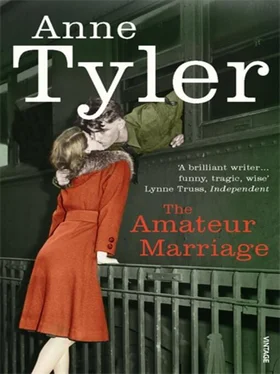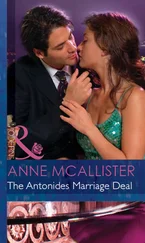“But Pagan himself said—”
“First and foremost, I need to ask if she took drugs in her first trimester.”
“You do?”
“These things can have lifelong effects. We need to be informed.”
“Well, I’m sorry, Gina, but Pagan told her he saw no point in seeing her.”
“You might at least have argued with him,” Gina said.
“I didn’t think I had the right to argue. Nor do you, in my humble opinion,” George told her, gathering steam. “Pagan’s the injured party, after all. He should be the one to decide if he wants to see her.”
“Well, this is just unacceptable,” Gina said.
George said, “Lots of things are unacceptable. That doesn’t mean they don’t happen.”
Although he had a strong suspicion that Gina was still too young to believe that.
Only Karen saw George’s side of things. First she demanded all the details. What Lindy had looked like was tops on her list (could she still fit into those jeans, provided she felt the inclination?), followed by why she hadn’t stuck around till Karen could get there, and what exactly her conversation with Pagan had consisted of. “At least he didn’t hang up on her, did he? Or did he? Do you think he asked her anything about who his father was?”
“I don’t have the faintest idea,” George told her.
“Well, I can’t say as I blame him, if you want to know the truth. She dumps him without a word, disappears, leaves him to fend for himself, and now all at once she says, ‘Dearie me, didn’t I have a child someplace? I wonder what’s become of him.’ Damn right he shouldn’t have to meet her.”
George didn’t talk with Karen very often. Oh, they liked each other well enough, he supposed, but they led such different lives. Also, he sensed that she was not all that fond of Sally, although she had never said anything. Now, though, he felt a surge of warmth for her. He said, “I wish you’d convince Gina of that.”
“Gina?”
“She just now telephoned me in a huff. Thinks I should have, I don’t know, put Lindy in a hammerlock till Gina could get over here and investigate her gene pool. I believe she was envisioning some big family confrontation.”
“Oh, then,” Karen said. “If Gina wants, I guess it’s going to happen.”
Gina was another subject George and Karen agreed on. George had almost forgotten that.
As if Lindy’s visit had lifted some kind of curtain or partition, George was visited over the next few days by what he would have to call flashbacks. They were more vivid than mere memories, and briefer — just single mental images, really. The wooden cane his father used to walk with, its worn, satiny handle that had filled George with love and sorrow any time he saw it hooked over the kitchen doorknob in the apartment on St. Cassian Street. A geranium plant his mother had rescued from a neighbor’s trash can and nursed into an overgrown monster that sent its segmented, scaly tentacles sprawling across the windowsill. Counting out change for customers from his father’s tall brass cash register. Getting his toes squeezed by the Fitting Lady when his mother took them shoe-shopping before the start of each new school year.
Then he recalled other shopping trips, dragging after his mother as she tirelessly hunted down bargains — the yawning, aching boredom of it. He remembered the time she stepped into a booth to try on a gray cotton dress and called out a few minutes later, her voice breaking up with laughter, “Children? Want to see what your mother would look like as a mental patient?” At the sight of her, Lindy had doubled over with the giggles, but George had felt too anxious to laugh; their mother was so convincing in her institutional gray.
And then the Christmas their father gave her the nightgown — black, with black lace cups at the bosom that were almost transparent. “Why, Michael!” she had said, and their father had looked sweetly foolish, lowering his eyes and grinning. She’d gone immediately into the bedroom to try it on. They were living in Elmview Acres by then, where the master bedroom lay just across the corridor from the living room, but instead of reappearing, their mother called softly, “Michael? Could you come here a minute?” Their father had set aside a box of socks he’d been fiddling with and risen and left, eyes still lowered, and the bedroom door had latched shut again and there hadn’t been another sound for ages. At the time the children were, oh, probably twelve, eleven, and seven or so — old enough to send each other embarrassed sidelong glances, although now the memory made George smile.
Well, so much about their parents had been embarrassing. Or did all children feel that way? But it seemed to George that the Antons’ lives were more extreme than other people’s. That very same nightgown, for instance, had only hours later given rise to a major battle when their mother thought to ask their father how he had known what size to buy. He’d taken Katie Vilna shopping with him, their father said, since he’d guessed that Pauline and Katie were more or less the same build. And then all hell broke loose. Whether it was their father’s colluding with another woman or their mother’s belief that Katie was flatter-chested than she was, George couldn’t say; but at any rate, their mother had exploded, and their father had called her crazy, and their mother had stuffed the nightgown into the waste-paper basket…
People didn’t stay on an even keel in the Anton family. They did exaggerated things like throwing out their clothes or running away from home or perishing in spectacular crashes.
Or showing up after twenty-nine years and wondering where everyone was.
Well, they did all get together eventually, just as Karen had predicted. Once Gina fixed her sights on something, watch out. She called Anna, she called Karen, she called George for Lindy’s telephone number, and then, by some unknown means, she persuaded Pagan to change his mind. Or maybe persuading Pagan came first. At any rate, it worked out that the family met at Anna’s house for lunch on a Sunday in March. Everyone attended but Jojo, who was away at school. Pagan brought Gina and the baby; Lindy brought her husband. A pork roast was served, along with an eggplant lasagna for Gina, who didn’t eat meat. Nothing particular happened. Nobody threw a scene or stalked out or burst into tears. Lindy did get a little shiny-eyed over her grandson — a standard-issue six-month-old who evidently reminded her of Pagan at the same age — but otherwise she behaved with restraint, and so did Pagan. In fact, they didn’t really have much to do with each other. Lindy seemed to have transferred all her feelings to the baby. She avoided talking with Pagan or even looking at him, if possible, and Pagan was his usual courteous, unforthcoming self. At the end of the afternoon the customary pleasantries were exchanged: must do this again, so good to have seen you, must come to our place next time… and then everybody went home. It was a perfectly civilized occasion.
So why was it that George had such a wretched time?
Slumped glumly on Anna’s piano bench before the meal, arms folded, chin on his chest, he surveyed the goings-on through a scrim of cynicism. Every remark called forth in him a silent, acidic “Yeah, right.” When Lindy said, “Just herbal tea for me, please, if you have it. I avoid all unnatural stimulants,” he rolled his eyes and exhaled a little too loudly. (She sounded like that simpering girl in Beauty and the Beast: “Just a single perfect rose for me, please, Father.”) And Michael’s response—”Oh, certainly! Coming right up!”—was so pitifully ingratiating, his face so eager and highly colored beneath his thin white hair.
Yes, even people’s looks were an irritation. Lindy’s husband turned out to be a caricature of the male English teacher, with his clipped salt-and-pepper beard you could mistake for the shape of his jaw and his mild gray gaze and suede elbow patches. Anna’s smooth pageboy, still mostly brown, seemed expressly designed to flaunt her self-possession. (George had a theory that hairdos revealed personalities — that people with flat, docile hair, for example, tended toward meekness while those with frizzy hair were uncontrolled and disorganized.) Gina was too lush and plummy, the damp spot over each nipple a disgrace. And how about Samantha, all in washed-out black and strung with ropes and ropes of nuts and beads and astrological symbols? A costume straight from Lindy’s old bureau drawers, but if Lindy recognized it she gave no sign. Conventional by comparison in a rough-woven peasant dress and fringed shawl, she was too busy mooning over the baby. Samantha, hovering next to her, might as well not have existed.
Читать дальше












